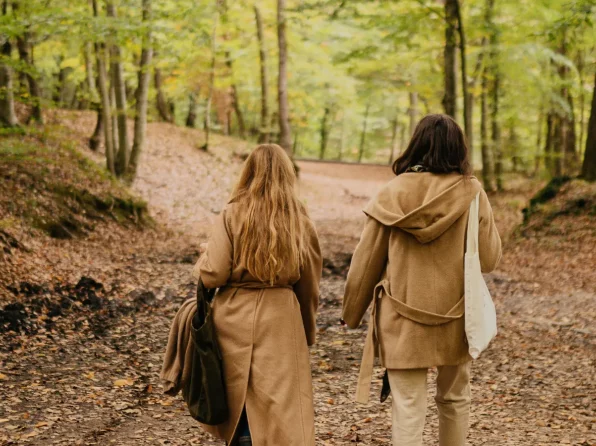
5 Ways Walk and Talk Therapy Can Help You
Are you considering walk and talk therapy?
By the end of this post you will have a sense of what walk and talk therapy involves and whether it’s right for you.
What is walk and talk therapy?
Walk and talk therapy (or as it’s sometimes called, outdoor therapy, nature therapy, wild therapy, ecotherapy) refers to talking therapy sessions that take place outside - usually in the natural environment - either while walking, sitting, or a mixture of both.
Getting outside is frequently recommended for improving mental health and wellbeing, so it’s no surprise that outdoor therapy is becoming increasingly popular.
Indoor therapy, whether in person, online or by telephone suits some individuals particularly well, however, for other clients, having therapeutic conversations in the open air, can bring a completely different and positive dynamic to the counselling experience.

5 ways outdoor therapy could work for you:

1. To help overcome anxiety about therapy
Face to face counselling works well for some, but the confinement of a therapy room can be quite intense and uncomfortable for others. That’s often the case if you’ve had a negative experience of therapy before, are neurodiverse, prefer to have less direct eye contact or generally find it easier to talk when moving. Walking together side by side with a counsellor, whilst increasing comfort levels, can also be helpful in fostering a sense of union and equality in the partnership between you and the therapist.

2. To help move therapy forwards
Research shows that working therapeutically outdoors can help if you are feeling ‘stuck’.
Moving your body and shifting your environment, can help you think differently about parts of your life that have previously felt unchangeable. This can be particularly helpful if you have feelings you find it difficult to explore. Being outside is a more relaxing experience for your body, therefore it might be easier for your mind to open up, stimulating new thoughts and ideas.

3. To increase connection with the natural environment
Contact with nature can feel rejuvenating, replenishing your mental resources, particularly after long periods of working indoors or in the energy-sapping environment of a city. Outdoor therapy could be a really helpful way of working if you don't have the opportunity to get outdoors and into nature very often and if you feel that you respond positively when you do.

4. To improve psychological health
The health benefits of walking and movement to help your mental health are well documented. Being outside in nature is generally mood-enhancing, triggering the release of endorphins, serotonin, dopamine, oxytocin and adrenaline in the body, resulting in a natural high and a sense of happiness. Research also suggests that spending time in the natural environment can help alleviate stress and anxiety. It has been found to decrease blood pressure and stress hormone levels, reduce nervous system stimulation, boost immune system function and enhance self-esteem.

5. To increase physical health
In addition to its psychological benefits, outdoor therapy can also improve your physical health. Walking therapy provides exercise and physical activity, which can improve your cardiovascular health, strengthen muscles and bones, and reduce your risk of chronic diseases like obesity and diabetes.
Frequently asked questions
Outdoor therapy is suitable for most and often more accessible for a lot of people. It can have great benefits for wheelchair users, those with limited mobility or neurodivergent individuals.
I am happy to walk in most weather but you might prefer not to. We can discuss your preferences during our first session. Weather can be unpredictable, so it's best to be prepared. Bring a waterproof jacket and appropriate shoes in case of rain, and wear suitable clothing and sunscreen during warmer weather. If the weather is too severe, we can consider having a session online or by phone instead.
Confidentiality is an integral part of therapy. I will discuss any questions and concerns about confidentiality with you during our first session. We can then agree on an approach for when we come into contact with other people, that you feel comfortable with.
We can address this at our first session and discuss any concerns and how to approach them. In the event that we should meet anyone we know, we might indicate it to one another using a code word or phrase, and pause our conversation until we are alone again. And/or it might involve acknowledging them from afar and moving on, being mindful not to encourage engagement.
The first session will take place either online or in person at my therapy rooms and lasts 50 minutes, the same length as your future sessions; however, it will feel slightly different. It is an assessment session, during which I try to get to know you as much as possible. We are aiming for breadth rather than depth in the first session.That means I will probably ask more questions than in future sessions, and we will probably jump from one topic to another, more so than in subsequent sessions. During this session, we will also discuss whether outdoor therapy is suitable for you. If so, we’ll discuss and finalise a risk assessment plus practical details such as location and routes which can be adapted to suit your individual needs.
Having counselling outdoors comes with many benefits. However, it may not be right for you at the moment. If you'd prefer to work indoors, I use private therapy rooms in Clapham and Battersea. Or we can work online from anywhere in the UK.
Book a free, 15-minute consultation call to see if we'd be a good fit to work together, for you to ask me any questions you might have, and for us to discuss booking an appointment.
If you have questions about my availability, fees, location (or anything else) ahead of booking a consultation call, please contact me through this form. Enquiries are usually answered within 24 hours.
OK, I’m interested in outdoor therapy. What happens next?
As you can see there are many benefits of walk and talk therapy. If you think outdoor therapy may benefit you, feel free to contact me for a free 15-minute phone consultation.
"...somehow the simple act of walking while talking out life's issues creates an environment of possibility and change."
Clay Cockrell
© Summers Counselling
Powered by WebHealer
